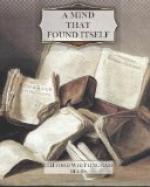The assistant physician, when he announced to me that I was to be subjected at night to this restraint, broke the news gently—so gently that I did not then know, nor did I guess for several months, why this thing was done to me. And thus it was that I drew deductions of my own which added not a little to my torture.
The gas jet in my room was situated at a distance, and stronger light was needed to find the keyholes and lock the muff when adjusted. Hence, an attendant was standing by with a lighted candle. Seating himself on the side of the bed, the physician said: “You won’t try again to do what you did in New Haven, will you?” Now one may have done many things in a city where he has lived for a score of years, and it is not surprising that I failed to catch the meaning of the doctor’s question. It was only after months of secret puzzling that I at last did discover his reference to my attempted suicide. But now the burning candle in the hands of the attendant, and a certain similarity between the doctor’s name and the name of a man whose trial for arson I once attended out of idle curiosity, led me to imagine that in some way I had been connected with that crime. For months I firmly believed I stood charged as an accomplice.
The putting on of the muff was the most humiliating incident of my life. The shaving of my legs and the wearing of the court-plaster brand of infamy had been humiliating, but those experiences had not overwhelmed my very heart as did this bitter ordeal. I resisted weakly, and, after the muff was adjusted and locked, for the first time since my mental collapse I wept. And I remember distinctly why I wept. The key that locked the muff unlocked in imagination the door of the home in New Haven which I believed I had disgraced—and seemed for a time to unlock my heart. Anguish beat my mind into a momentary sanity, and with a wholly sane emotion I keenly felt my imagined disgrace. My thoughts centred on my mother. Her (and other members of the family) I could plainly see at home in a state of dejection and despair over her imprisoned and heartless son. I wore the muff each night for several weeks, and for the first few nights the unhappy glimpses of a ruined home recurred and increased my sufferings.
It was not always as an instrument of restraint that the muff was employed. Frequently it was used as a means of discipline on account of supposed stubborn disobedience. Many times was I roughly overpowered by two attendants who locked my hands and coerced me to do whatever I had refused to do. My arms and hands were my only weapons of defence. My feet were still in plaster casts, and my back had been so severely injured as to necessitate my lying flat upon it most of the time. It was thus that these unequal fights were fought. And I had not even the satisfaction of tongue-lashing my oppressors, for I was practically speechless.
My attendants, like most others in such institutions, were incapable of understanding the operations of my mind, and what they could not understand they would seldom tolerate. Yet they were not entirely to blame. They were simply carrying out to the letter orders received from the doctors.




